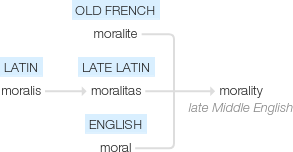Morality
late Middle English: from Old French moralite or late Latin moralitas, from Latin moralis (see moral).
wiktionary
From Anglo-Norman moralité, Middle French moralité, from Late Latin mōrālitās(“manner, characteristic, character”), from Latin mōrālis(“relating to manners or morals”), from mōs(“manner, custom”). equivalent to moral + -ity.
etymonline
morality (n.)
late 14c., moralite, "moral qualities, virtuous conduct or thought," from Old French moralite (Modern French moralité) "moral (of a story); moral instruction; morals, moral character" (13c.) and directly from Late Latin moralitatem (nominative moralitas) "manner, character," from Latin moralis "of manners or morals; moral" (see moral (adj.)). Meaning "doctrine or system of ethical duties" is from mid-15c. Meaning "goodness, characteristic of being moral, virtuousness" is attested from 1590s.
Where there is no free agency, there can be no morality. Where there is no temptation, there can be little claim to virtue. Where the routine is rigorously proscribed by law, the law, and not the man, must have the credit of the conduct. [William H. Prescott, "History of the Conquest of Peru," 1847]
